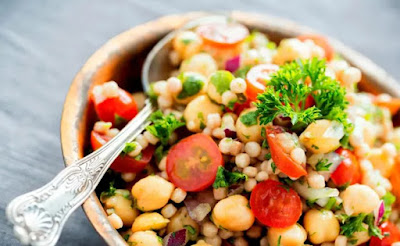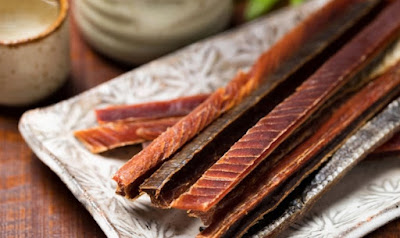Right off the bat please know that I have only recently begun to include leeks in my cooking. Why have I overlooked this green beauty for decades? I have no clue. A recent recipe I found had them as a fairly substantial component and... well... I fell in love. I have since been experimenting with leeks, embracing their similar yet different flavor when compared to my go-to onions and scallions. As a new favorite in my pantry, leeks deserved some nutritional exploring. What follows is an article found on Health.com that gives some interesting insight. Enjoy!
Health Benefits of Leeks
Jillian Kubala, MS, is a registered dietitian based in Westhampton, NY. Jillian uses a unique and personalized approach to help her clients achieve optimal wellness through nutrition and lifestyle changes. In addition to her private practice, Jillian works as a freelance writer and editor and has written hundreds of articles on nutrition and wellness for top digital health publishers.
Published on February 5, 2024
Medically reviewed by Elizabeth Barnes,
RDN
Leeks (Allium fistulosum L.) belong to the allium
family of vegetables, which also includes onions, shallots, scallions, chives,
and garlic. They have a mild, slightly sweet taste and are commonly used in
dishes like soups and pasta.
Leeks are a rich source of antioxidant plant
compounds and nutrients that may benefit health in several ways, such as
protecting against certain diseases and promoting gut health.
Here's everything you need to know about leeks, including
their potential health benefits, nutrition, and more.
1. High in Anti-Inflammatory and Antioxidant Compounds
Leeks are concentrated in cellular-protective and
anti-inflammatory compounds, such as flavonoids and organosulfur compounds. For
example, leeks are high in quercetin,
a flavonoid compound that may help protect cells from oxidative damage, which
may help lower the risk of chronic diseases, like heart disease.
Numerous studies have found that people with higher intakes
of flavonoids, including quercetin, have lower rates of heart disease and
heart-related health complications, such as heart attacks. Researchers suggest
that the antioxidant and anti-inflammatory activity of quercetin and other
flavonoids contributes significantly to their beneficial impact on heart
health.
Quercetin may also help protect against neurodegenerative
diseases by suppressing inflammation in the
brain, stimulating the regeneration of nerve cells, and interfering with the
formation of neurotoxic substances associated with the development of Alzheimer's disease.
2. May Protect Against Certain Cancers
A diet rich in allium vegetables, like leeks, may help
protect against some cancers, such as breast cancer.
The organosulfur compounds, flavonoids, and antioxidant nutrients concentrated
in leeks have powerful anticancer effects, and studies show that people who
consume more allium vegetables have lower rates of certain cancers.
For example, a 2022 review of 17 studies found that women
with the highest intake of total allium vegetables, including garlic, onions,
leeks, and chives, had a 30% lower risk of breast cancer compared to women with
the lowest intake.
Research findings also suggest that allium vegetables may be
protective against stomach
cancer, prostate cancer, and many other common types of cancer. Findings
from a 2022 review of 25 studies suggested that consumption of allium
vegetables could decrease the risk of non-digestive tract cancers, such
as prostate
cancer, by as much as 14%.
The flavonoid antioxidants, organosulfur compounds,
and vitamin
C found in leeks may protect against cancer by inhibiting cancer cell
growth, reducing inflammation, and protecting cells from oxidative
damage.
3. Supports Gut Health
Leeks are an excellent source of prebiotics. Prebiotics are
undigestible compounds found in certain foods that are broken down by gut
bacteria in the large intestine. When bacteria break down or ferment
prebiotics, it releases byproducts called short-chain fatty acids (SCFAs).
SCFAs act as an energy source for the cells that line the colon and benefit gut
health in several ways.
For example, SCFAs suppress inflammation in the intestines,
regulate intestinal pH, and support the growth of beneficial bacteria. What's
more, SCFAs have anticancer effects and may help protect against cancers of the
digestive system, like colorectal
cancer.
Additionally, leeks contain anti-inflammatory substances,
like organosulfur compounds and flavonoids, which may help promote a healthy
gut environment and protect against bowel-related diseases, such as
inflammatory bowel disease, by reducing intestinal inflammation.
4. May Benefit Cognitive Function
Eating more vegetables, in general, is an effective way to
boost brain health, but certain vegetables, like leeks, may be especially
effective for protecting and improving cognitive function.
Leeks contain carotenoid pigments, which have been shown to
benefit brain health. Leeks are especially rich in the carotenoids lutein and
zeaxanthin. These pigments are found in high concentration in the retina, a
layer of tissue located at the back of the eyeball. Macular pigment (MP), or
the retinal accumulation of lutein and zeaxanthin, is linked to
cognitive function, with higher MP associated with better cognitive performance
and memory.
A number of studies in both children and adults have shown
that lower MP is related to poorer performance on cognitive tests, poorer memory,
and slower reaction times, while higher MP is associated with better cognitive
function.
Additionally, people with Alzheimer's
disease have been found to have significantly lower MP compared to
people without Alzheimer's.
Diets rich in leeks have also been associated with smaller
improvements in cognitive performance, including attention and memory, and
research suggests that consuming lutein-rich foods may help prevent cognitive
decline. Leeks are amongst the richest sources of lutein and zeaxanthin you can
eat, making them an important food for brain health.
Nutritional Facts of Leeks
Leeks provide several nutrients, such as vitamins A, C, and
B6.
Here's the nutrition breakdown for a one-cup serving of
cooked leek:
- Calories: 31
- Fat: 0 grams (g)
- Carbohydrates: 7.62 g
- Fiber: 1 g
- Protein: 0.81 g
- Vitamin A: 41 micrograms (mcg) or 5% of the Daily Value (DV)
- B6: 0.113 milligrams (mg) or 7% of the DV
- Copper: 0.062 mg or 7% of the DV
- Folate: 24 mcg or 6% of the DV
- Vitamin C: 4.2 mg or 5% of the DV
- Vitamin K: 25.4 mcg or 21% of the DV
- Manganese: 0.247 mg or 11% of the DV
Leeks are very low in calories, but do contain a decent
amount of essential vitamins and minerals, including vitamins like vitamins A,
B6, C, and K, and minerals like copper and manganese.
They're especially rich in vitamin K, a nutrient that's
required for blood
clotting and plays important roles in bone and
heart health.
Additionally, leeks are also a good source of manganese, a
mineral that's also required for blood clotting as well as energy metabolism,
and the functioning of the immune and nervous systems.
Risks of Eating Leeks
Leeks are safe for most people to eat, but should be avoided
by those who are allergic to leeks. Leeks contain a compound called diallyl
disulfide, which can cause skin reactions, including an itchy, red rash called
contact dermatitis,
in some people.
Also, leeks are high in compounds called FODMAPs, which is an
acronym that stands for Fermentable Oligo-, Di-, Mono-saccharides, And Polyols.
FODMAPs are types of carbohydrates concentrated in certain foods, like garlic and leeks, that
are poorly absorbed by the digestive system.
People who are sensitive to FODMAPs may experience digestive
symptoms, such as bloating, diarrhea,
and gas after consuming high-FODMAP foods. People with certain digestive
conditions, like Irritable
bowel syndrome (IBS), are more likely to be intolerant to FODMAPs.
People who are intolerant to FODMAPs may need to cut
high-FODMAP foods, like leeks, out of their diet to avoid gastrointestinal side
effects.
Tips for Consuming Leeks
Leeks can be added to a variety of savory dishes and can be
used in the same way as onions and shallots.
They have a mild, sweet, onion-like flavor and are delicious
in baked goods, soups, egg dishes, and more.
Here are a few ways to add leeks to your diet:
Add caramelized leeks to savory baked goods, sandwiches,
eggs, and potato salad.
Use leeks in stews, soups, and broths for a kick of flavor.
Incorporate sautéed leeks into egg dishes like omelets and
frittatas.
Thinly slice or dice raw leeks and use them in salads or as
a garnish.
Try adding leeks to guacamole and tuna, chicken, and bean
salads.
Use leeks in place of onions in stir-fry dishes.
Add leeks to pasta, rice, and quinoa recipes.
Use the tough part of leeks to add flavor to sauces and
broths.
Leeks should be thoroughly washed before cooking because
dirt and other debris can get caught in their many layers.
Though the entire leek is edible, most people use the more
tender white and lighter-green parts of the plant and discard the tougher, dark
green top part. However, this dark green section can be saved and used to
infuse flavor into broths, sauces, and other recipes and can be stored in your
freezer until you're ready to use it.
A Quick Review
Leeks are allium vegetables that are concentrated in
health-promoting plant compounds, such as flavonoids and organosulfur
compounds.
Eating leeks may benefit health in several ways, from
increasing the antioxidant density of your diet to protecting against cognitive
decline and some health conditions, like breast cancer.
Leeks have a sweet, onion-like taste that pairs well with
many savory foods, but keep in mind that they're high in FODMAPs and may cause
unpleasant gastrointestinal side effects in sensitive people.
--------------------------------------------------------------------
Have a great week, everyone, and thank you for your support!
Blessed be… and happy cooking!
Chef Michael R





























.jpg)










